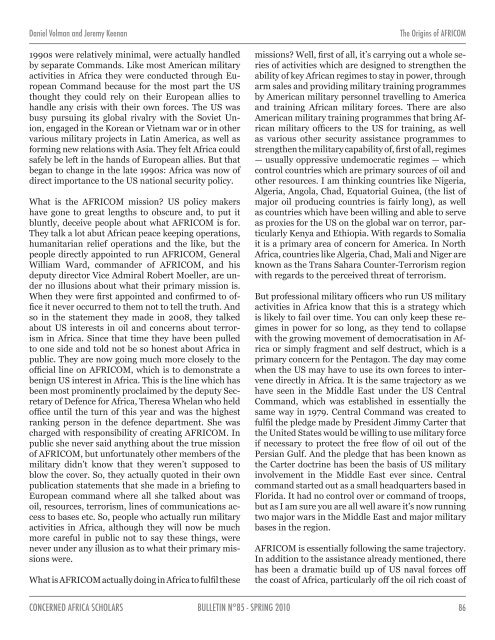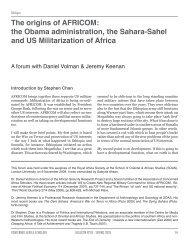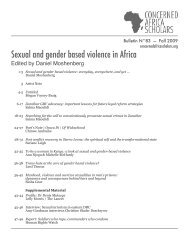Western Sahara and the United States' geographical imaginings
Western Sahara and the United States' geographical imaginings
Western Sahara and the United States' geographical imaginings
Create successful ePaper yourself
Turn your PDF publications into a flip-book with our unique Google optimized e-Paper software.
Daniel Volman <strong>and</strong> Jeremy Keenan The Origins of AFRICOM<br />
1990s were relatively minimal, were actually h<strong>and</strong>led<br />
by separate Comm<strong>and</strong>s. Like most American military<br />
activities in Africa <strong>the</strong>y were conducted through European<br />
Comm<strong>and</strong> because for <strong>the</strong> most part <strong>the</strong> US<br />
thought <strong>the</strong>y could rely on <strong>the</strong>ir European allies to<br />
h<strong>and</strong>le any crisis with <strong>the</strong>ir own forces. The US was<br />
busy pursuing its global rivalry with <strong>the</strong> Soviet Union,<br />
engaged in <strong>the</strong> Korean or Vietnam war or in o<strong>the</strong>r<br />
various military projects in Latin America, as well as<br />
forming new relations with Asia. They felt Africa could<br />
safely be left in <strong>the</strong> h<strong>and</strong>s of European allies. But that<br />
began to change in <strong>the</strong> late 1990s: Africa was now of<br />
direct importance to <strong>the</strong> US national security policy.<br />
What is <strong>the</strong> AFRICOM mission? US policy makers<br />
have gone to great lengths to obscure <strong>and</strong>, to put it<br />
bluntly, deceive people about what AFRICOM is for.<br />
They talk a lot abut African peace keeping operations,<br />
humanitarian relief operations <strong>and</strong> <strong>the</strong> like, but <strong>the</strong><br />
people directly appointed to run AFRICOM, General<br />
William Ward, comm<strong>and</strong>er of AFRICOM, <strong>and</strong> his<br />
deputy director Vice Admiral Robert Moeller, are under<br />
no illusions about what <strong>the</strong>ir primary mission is.<br />
When <strong>the</strong>y were first appointed <strong>and</strong> confirmed to office<br />
it never occurred to <strong>the</strong>m not to tell <strong>the</strong> truth. And<br />
so in <strong>the</strong> statement <strong>the</strong>y made in 2008, <strong>the</strong>y talked<br />
about US interests in oil <strong>and</strong> concerns about terrorism<br />
in Africa. Since that time <strong>the</strong>y have been pulled<br />
to one side <strong>and</strong> told not be so honest about Africa in<br />
public. They are now going much more closely to <strong>the</strong><br />
official line on AFRICOM, which is to demonstrate a<br />
benign US interest in Africa. This is <strong>the</strong> line which has<br />
been most prominently proclaimed by <strong>the</strong> deputy Secretary<br />
of Defence for Africa, Theresa Whelan who held<br />
office until <strong>the</strong> turn of this year <strong>and</strong> was <strong>the</strong> highest<br />
ranking person in <strong>the</strong> defence department. She was<br />
charged with responsibility of creating AFRICOM. In<br />
public she never said anything about <strong>the</strong> true mission<br />
of AFRICOM, but unfortunately o<strong>the</strong>r members of <strong>the</strong><br />
military didn’t know that <strong>the</strong>y weren’t supposed to<br />
blow <strong>the</strong> cover. So, <strong>the</strong>y actually quoted in <strong>the</strong>ir own<br />
publication statements that she made in a briefing to<br />
European comm<strong>and</strong> where all she talked about was<br />
oil, resources, terrorism, lines of communications access<br />
to bases etc. So, people who actually run military<br />
activities in Africa, although <strong>the</strong>y will now be much<br />
more careful in public not to say <strong>the</strong>se things, were<br />
never under any illusion as to what <strong>the</strong>ir primary missions<br />
were.<br />
What is AFRICOM actually doing in Africa to fulfil <strong>the</strong>se<br />
missions? Well, first of all, it’s carrying out a whole series<br />
of activities which are designed to streng<strong>the</strong>n <strong>the</strong><br />
ability of key African regimes to stay in power, through<br />
arm sales <strong>and</strong> providing military training programmes<br />
by American military personnel travelling to America<br />
<strong>and</strong> training African military forces. There are also<br />
American military training programmes that bring African<br />
military officers to <strong>the</strong> US for training, as well<br />
as various o<strong>the</strong>r security assistance programmes to<br />
streng<strong>the</strong>n <strong>the</strong> military capability of, first of all, regimes<br />
— usually oppressive undemocratic regimes — which<br />
control countries which are primary sources of oil <strong>and</strong><br />
o<strong>the</strong>r resources. I am thinking countries like Nigeria,<br />
Algeria, Angola, Chad, Equatorial Guinea, (<strong>the</strong> list of<br />
major oil producing countries is fairly long), as well<br />
as countries which have been willing <strong>and</strong> able to serve<br />
as proxies for <strong>the</strong> US on <strong>the</strong> global war on terror, particularly<br />
Kenya <strong>and</strong> Ethiopia. With regards to Somalia<br />
it is a primary area of concern for America. In North<br />
Africa, countries like Algeria, Chad, Mali <strong>and</strong> Niger are<br />
known as <strong>the</strong> Trans <strong>Sahara</strong> Counter-Terrorism region<br />
with regards to <strong>the</strong> perceived threat of terrorism.<br />
But professional military officers who run US military<br />
activities in Africa know that this is a strategy which<br />
is likely to fail over time. You can only keep <strong>the</strong>se regimes<br />
in power for so long, as <strong>the</strong>y tend to collapse<br />
with <strong>the</strong> growing movement of democratisation in Africa<br />
or simply fragment <strong>and</strong> self destruct, which is a<br />
primary concern for <strong>the</strong> Pentagon. The day may come<br />
when <strong>the</strong> US may have to use its own forces to intervene<br />
directly in Africa. It is <strong>the</strong> same trajectory as we<br />
have seen in <strong>the</strong> Middle East under <strong>the</strong> US Central<br />
Comm<strong>and</strong>, which was established in essentially <strong>the</strong><br />
same way in 1979. Central Comm<strong>and</strong> was created to<br />
fulfil <strong>the</strong> pledge made by President Jimmy Carter that<br />
<strong>the</strong> <strong>United</strong> States would be willing to use military force<br />
if necessary to protect <strong>the</strong> free flow of oil out of <strong>the</strong><br />
Persian Gulf. And <strong>the</strong> pledge that has been known as<br />
<strong>the</strong> Carter doctrine has been <strong>the</strong> basis of US military<br />
involvement in <strong>the</strong> Middle East ever since. Central<br />
comm<strong>and</strong> started out as a small headquarters based in<br />
Florida. It had no control over or comm<strong>and</strong> of troops,<br />
but as I am sure you are all well aware it’s now running<br />
two major wars in <strong>the</strong> Middle East <strong>and</strong> major military<br />
bases in <strong>the</strong> region.<br />
AFRICOM is essentially following <strong>the</strong> same trajectory.<br />
In addition to <strong>the</strong> assistance already mentioned, <strong>the</strong>re<br />
has been a dramatic build up of US naval forces off<br />
<strong>the</strong> coast of Africa, particularly off <strong>the</strong> oil rich coast of<br />
CONCERNED AFRICA SCHOLARS BULLETIN N°85 - SPRING 2010 8




